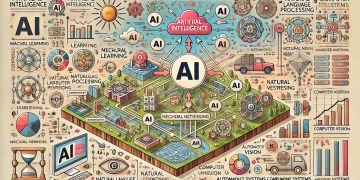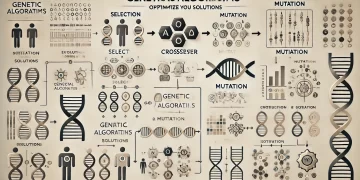Artificial Intelligence (AI) has become a pivotal force in reshaping the healthcare landscape, offering groundbreaking solutions that improve patient outcomes, optimize operations, and accelerate research. From personalized treatment plans to automating routine tasks, AI is empowering healthcare providers to address complex challenges with precision and efficiency. This article explores the vast array of use cases where AI is making an indelible impact on the healthcare sector.
1. Medical Imaging and Diagnostics
One of the most transformative applications of AI in healthcare lies in medical imaging and diagnostics. AI-powered algorithms, particularly those using computer vision, analyze complex medical images such as X-rays, MRIs, and CT scans. These tools can detect patterns that may be imperceptible to the human eye, enabling earlier and more accurate diagnoses for diseases such as cancer, cardiovascular conditions, and neurological disorders. AI systems significantly reduce diagnostic errors and help radiologists prioritize urgent cases.
Example:
Deep learning models trained on thousands of radiological images have achieved remarkable success in identifying early-stage breast cancer, often outperforming human radiologists. Companies like Zebra Medical Vision and Aidoc are leading the way in integrating AI into radiological workflows.
2. Predictive Analytics for Public and Individual Health
AI-driven predictive analytics is revolutionizing how healthcare providers anticipate and address health-related trends. On a macro level, AI models analyze vast datasets to predict disease outbreaks, track the spread of epidemics, and identify at-risk populations. On an individual level, AI predicts patient risks, helping physicians implement preventive measures and personalized care strategies.
Example:
Predictive tools such as Google’s DeepMind analyze Electronic Health Records (EHRs) to forecast conditions like acute kidney injury, allowing for timely interventions and improved patient outcomes.
3. Personalized Medicine and Genomics
Personalized medicine leverages AI to tailor treatment strategies based on a patient’s unique genetic makeup, lifestyle, and medical history. This approach ensures that therapies are not only effective but also minimize adverse side effects. AI algorithms are also instrumental in analyzing genomic data, identifying disease-causing mutations, and selecting targeted therapies.
Example:
AI platforms such as IBM Watson for Genomics enable precision medicine by analyzing genetic variations to recommend suitable treatment options for cancer patients.
4. Virtual Health Assistants and Chatbots
Virtual assistants powered by natural language processing (NLP) are enhancing patient engagement and support. These AI-driven tools provide patients with information about medications, symptom management, and appointment scheduling, all while offering 24/7 accessibility. Virtual health assistants also help manage chronic conditions by reminding patients to take medications and track their symptoms.
Example:
Apps like Ada Health and Babylon Health utilize conversational AI to guide patients through preliminary symptom assessments, advising when to seek professional care.
5. AI in Drug Discovery and Development
Drug discovery is an intricate and time-consuming process that can take over a decade to bring a new drug to market. AI accelerates this process by analyzing molecular data, predicting drug efficacy, and identifying potential side effects. These models reduce the time and cost involved in developing treatments for diseases that were once considered untreatable.
Example:
AI platforms like Insilico Medicine and Atomwise have revolutionized drug discovery by simulating how different compounds interact with biological systems.
6. Robotics in Surgery
AI-driven robotics is enhancing precision, accuracy, and efficiency in surgical procedures. Robots equipped with AI assist surgeons by providing real-time analytics and visual guidance, reducing the risk of human error. These systems are especially beneficial in minimally invasive procedures, where precision is paramount.
Example:
The da Vinci Surgical System, one of the most advanced robotic surgical platforms, uses AI to assist in complex surgeries, offering improved patient recovery times.
7. Administrative Efficiency and Optimization
Healthcare systems often face administrative bottlenecks that consume valuable time and resources. AI automates routine administrative tasks like appointment scheduling, medical billing, and documentation, allowing healthcare professionals to focus more on patient care.
Example:
AI-powered platforms like Olive and RPA bots streamline administrative processes, reducing costs and minimizing errors.
8. Mental Health Care with AI
Mental health care has seen significant advancements with AI technologies that monitor and analyze emotional well-being. Sentiment analysis, a branch of NLP, enables AI tools to gauge an individual’s mental state and suggest coping mechanisms. Virtual mental health assistants also provide immediate support for patients experiencing anxiety or depression.
Example:
AI chatbots like Woebot and Wysa engage users in conversations to help them manage stress, offering tools and exercises based on cognitive behavioral therapy (CBT).
9. Remote Patient Monitoring and Telehealth
AI plays a vital role in enabling remote healthcare delivery, particularly in underserved and rural areas. Wearable devices equipped with AI algorithms monitor patients’ vital signs in real time and alert caregivers to any abnormalities. Telehealth platforms integrate AI to optimize virtual consultations and enhance decision-making.
Example:
AI-supported wearables like Fitbit and Apple Health not only track physical activity but also detect irregular heart rhythms, providing early warnings of potential health issues.
10. Ethical Considerations and Challenges
While AI offers immense benefits, it also raises ethical questions around data privacy, bias in algorithm design, and patient consent. Ensuring transparency, accountability, and inclusivity in AI development is crucial to realizing its full potential without compromising ethical standards.
Conclusion
AI is undeniably transforming healthcare, addressing critical challenges and delivering unprecedented innovations. As these technologies evolve, they hold the promise of improving access to quality care, reducing costs, and advancing our understanding of complex medical conditions. While challenges remain, the future of AI in healthcare is bright, with countless opportunities to revolutionize patient care and outcomes.
References
- Topol, Eric J. Deep Medicine: How Artificial Intelligence Can Make Healthcare Human Again. Basic Books, 2019.
- Jiang, F., et al. “Artificial Intelligence in Healthcare: Past, Present, and Future.” Stroke and Vascular Neurology, 2017.
- National Institutes of Health (NIH). “AI in Medicine: From Bench to Bedside.” 2023.
- World Health Organization (WHO). “Ethics and Governance of AI for Health.” 2021.
- McKinsey & Company. “AI in Healthcare: Driving Efficiency and Innovation.” 2023.




































